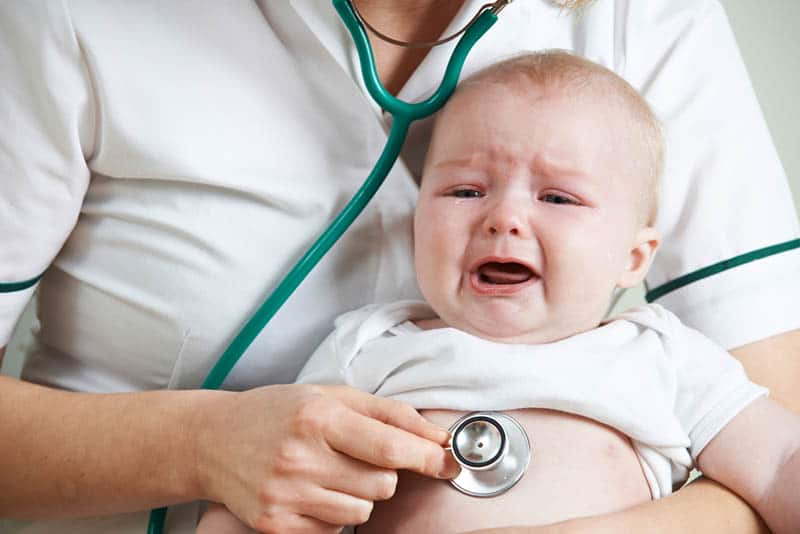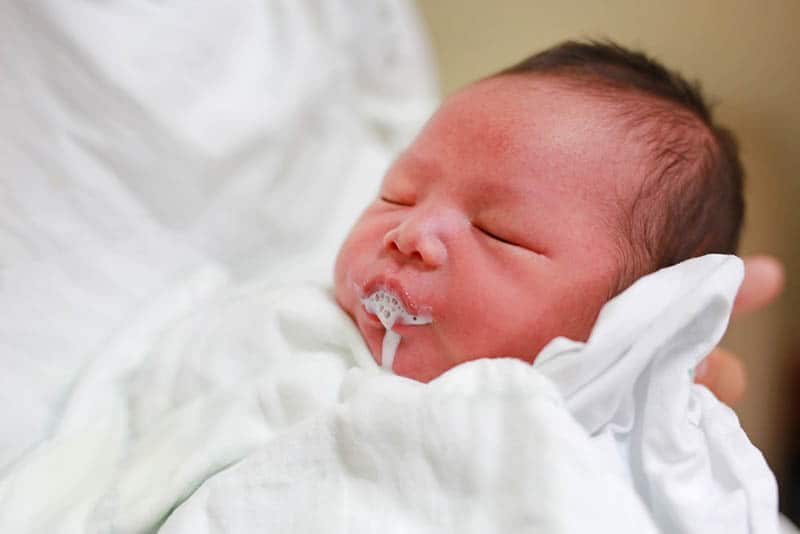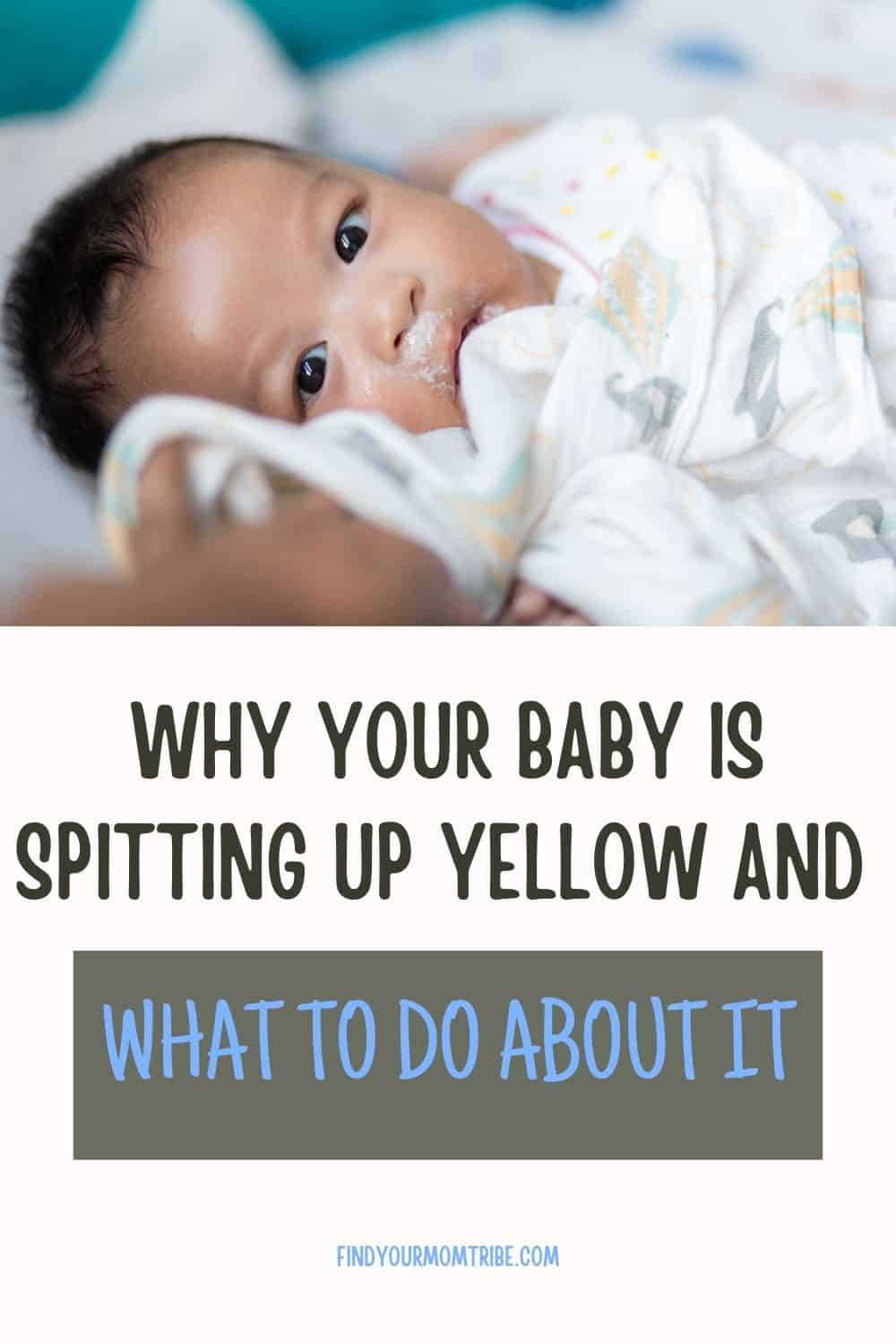There are many things that are scary for parents, especially for new parents, particularly when it comes to their little one’s body.
Things like a baby spitting up yellow can cause enormous amounts of stress. That’s why it’s important to understand why it happens in the first place.
There are numerous reasons for your baby spitting up yellow with some of the most common ones being your child being sick, infrequent burping sessions, post colostrum breastfeeding spit up, and acid reflux.
In worst-case scenarios, the spit-up turns out to actually be bile and that’s when it’s really dangerous.
It usually signals that your child is getting dangerously dehydrated which is very likely to lead to worse complications, though at this point your little one will probably be vomiting and not just spitting up.
Should that happen, make sure to immediately contact your family doctor, pediatrician, or any other qualified health care professional.
In general, however, a baby’s spit up isn’t anything dangerous and will appear as nothing more than drool.
People often confuse a baby spitting up with vomiting which is something that’s much more abrupt and happens in much larger quantities, but more on that later.
Read on if you want clarity on the causes of your baby spitting up yellow and for a detailed description of the difference between the act of spitting up and vomiting.
The Possible Reasons For Your Baby Spitting Up Yellow

Normally, spit up is a clear or white-ish liquid, that’s barely discernible from regular spit and doesn’t come out in large quantities.
It’s a common occurrence, especially when trying to burp your baby, but sometimes things happen that might alter its appearance.
It’s important to know what these changes are and what causes them so you don’t have to panic about every little change.
After all, us mammas have to conserve as many nerves as we can otherwise we’d be nervous wrecks because there are so many things that can change with kids on a daily basis.
Your child is sick

When your child gets a bit sick, they’ll have a bit of mucus build up in their throats, much like anyone else.
When you lay the baby down, this mucus can sometimes reach the baby’s stomach.
This usually stays inside the digestive system, but seeing as theirs isn’t as well-developed as ours, the mucus often ends up upsetting their little tummies.
This results in some of the contents of the stomach going right back up the esophagus.
This then ends up in your baby’s spit up or, if the matter is worse, in your baby’s throw up.
If this persists over a couple of days or if the spit up has the consistency of yellow mucus, you should schedule an appointment with your pediatrician or family doctor because this is usually the clear sign of a sinus infection or some sort of infection.
Your child hasn’t been burped in a while

The undeveloped digestive system during your baby’s first year once again plays a role here.
If your child isn’t burped, has a little bit of constipation, smacks their lips, or hasn’t managed to poop, yellow spit up can happen.
This is because the breast milk or formula lingers a bit too much inside their stomachs which allows it to ferment and when you finally do burp them, the spit up ends up coming out the color and texture of spoiled milk with that all too familiar smell to boot.
This isn’t as serious as some of the other causes, but it does make your child uneasy and fussy so it’s worth remembering to burp them just to give their digestive system a little bit of a jump start.
Your little one has acid reflux

Another bowel-related problem that isn’t all too serious but will probably make your child cry more often is acid reflux also known as infant reflux.
It often happens when there’s some sort of blockage in their stomach which causes the stomach acids and bile to build up and shoot up the esophagus.
For adults, it usually stops at a slight burning sensation, but for little kids it’s a bit more than that.
Little ones typically end up throwing up most of their stomach contents – stomach acid and all – which can cause serious discomfort.
The throw up will usually be lined in yellow bile and mucus.
This is rarely a serious situation but, just in case, it might be worth phoning up your doctor to make sure everything is okay – even if it’s for your own peace of mind.
This is especially recommended if the throwing up is persistent.
A frequent cause of acid reflux is something called GERD (gastroesophageal reflux disease) which is very common in babies up until they’re 1 year old.
It’s caused by a weakened lower esophageal sphincter which is responsible for keeping stomach contents where they belong, away from the more sensitive parts of one’s body that aren’t protected by stomach lining.
There’s also the fact that your child’s esophageal sphincter is probably not fully developed yet which ends up causing GERD in most kids for their first year of life and then the symptoms slowly ease up and disappear.

The most common symptoms of GERD in infants are:
• Frequent coughs, especially dry ones
• The feeling of irritation around the throat area, usually after a meal
• Having difficulty breathing and constant wheezing
• Having difficulty swallowing food or outright gagging
• A follow-up symptom of that is a reduced appetite or outright unwillingness to eat
• A further symptom is potential weight loss and overall poor weight gain
• The child arches their back and wiggles around as if trying to make the food go down smoother
• A frequently colicky baby
• Vomiting often
While the symptoms might seem severe, the situation can be treated quite easily and the symptoms can be lessened to an extent.
In order to do that, you need to sit the baby upright after each feeding.
Keeping them in an upright position helps the food go down more easily, aiding their still undeveloped digestive tracts.
Another thing is to avoid frequent feedings because you might be overfeeding your baby.

This goes for both formula fed and breastfed babies equally.
Try spacing the feedings out and stick to recommended doses even if your child starts making a fuss about it.
The problem might also be that the mixture simply isn’t thick enough to be held down or to linger in the stomach long enough to be digested.
If that’s the case, try mixing some oats or rice cereal into your child’s food to weigh it down and help it absorb some of the stomach acid.
Do make sure to seek advice from a pediatric gastroenterology specialist before you do to get the right consistency otherwise it might not be able to escape the baby bottle.
If you encounter this problem, just widen the opening of the nipple slightly by cutting a little X into it.
Another possible cause for formula fed babies in particular is an allergy to milk protein.
If you suspect this to be the case, make sure to advise your pediatrician/family doctor on the matter so he can determine if that truly is the cause and to suggest what new formula you should start feeding to your little one.
Ultimately, if your child’s GERD symptoms don’t subside when they reach 12 months of age and nothing seems to help, the final option is to have them undergo surgery to remedy the issue. It’s an extreme measure, but also very rarely necessary.
Only 10% of babies ever really have any lingering issues with GERD after they reach their first birthday.
Some formulas close to breast milk, such as Gerber Good Start A2, might be of great help as they include probiotics and prebiotics essential for the proper function of your baby’s digestive system.
You’ve breastfed them colostrum

During your first feeding, you’ll be giving your child colostrum, also known as a mother’s first breast milk.
It’s a bit thicker in texture and yellower than usual because it’s filled with many beneficial vitamins and nutrients.
Because your kid is a newborn, they might not be able to process the colostrum as quickly so you might see your baby spitting up yellow fluid in smaller amounts, but not to worry as it’s completely natural in this case.
This might occur a few more times until your breast milk comes in.
Keep in mind that some babies spit up breast milk but not baby formula.
The yellow in the spit up is bile

Remember the earlier mention of your child throwing up bile due to infant reflux?
Well, if that spit up is bright yellow or worse, throw up, then it can be a sign of something much worse.
There may be no contents left in your child’s stomach or there might be an issue with their liver.
The main concern here, as stated at the start, is dehydration. If left untreated, this can lead to worse complications, potentially fatal ones.
It’s important to set up an appointment with your doctor as soon as possible so he can diagnose the issue properly and remedy it.
The usual cause is a stomach infection or some sort of virus, but it can also be due to constipation or a bowel obstruction.
The worst case scenario is a serious problem such as a hereditary illness or similar which could be very challenging.
In order to prevent anything too serious from happening, it’s worth taking note of the early signs of this problem or dehydration in general.
Some of the most common ones are:
• Cracked lips with peeling skin
• Sunken eyes that make them appear malnourished
• A dry mouth
• Dry stools and general lack of wet diapers (less than six daily)
• Struggling to poop in general
• The child is crying but there are no tears
Should you notice any of these symptoms, give your doctor or pediatrician a call immediately.
They’re there to help you with anything that might worry you about your child and it’s their job to be on call so don’t concern yourself too much thinking that you might be calling too often.
The Difference Between Vomiting And Spitting Up

Now that you know what the potential reasons may be for your baby spitting up yellow mucus or liquid, it’s worth learning the difference between spitting up and vomiting.
The two are often confused because they sound similar and are often caused by similar things, but are vastly different in both danger level and appearance.
When someone is about to vomit, that’s a lot more apparent.
Your child will try to lurch forward because it’s a more forceful reflex; a tightening of the muscles to launch the contents of the stomach outward and expel it because the body feels threatened by the contents for whatever reason.
This is why it’s often referred to as projectile vomiting as it simply comes out as a blast of stomach content whereas spit ups are a lot more controlled and come out with a lot less content.
A telltale sign that your child is going to spit up is that you’ll often get a burp before which is where the term ‘burping your child’ came from in the first place.
It’s also a lot less forceful on the child’s body and stomach in general as the muscles don’t instantly cramp up or with as much intensity as they would if they were throwing up.
Also, as mentioned before, when someone vomits, there’s just a whole lot more than with spitting up.
The latter feels more like a dribble of drool while the former can be your child’s entire breakfast.
The next thing worth noting is that the act of spitting up is most often harmless, whereas the act of vomiting is more often than not a sign that your child is sick.
This is because two of the main causes of vomiting are stomach infections and viral infections.

Should you see your child vomiting, it’s worth taking their temperature first and giving your doctor a call afterwards in case of any other signs that your baby might be sick.
Throwing up can be very uncomfortable for your little one and it may be an early warning sign that something is wrong.
One possible problem that frequent vomiting might be a sign of in kids that are anywhere between a newborn to a 6-month-old child is.
This condition affects the lower end of the stomach which sends all the processed food down the small intestine.
It’s an abnormality where the muscles surrounding that area enlarge and thus constrict this area also known as the pylorus (hence the name) restricting access to the small intestine and causing food to get backed up in the stomach.
This is a very serious issue that will need immediate treatment, which is usually surgery.
The most common symptoms of pyloric stenosis are:
• Very frequent and violent vomiting
• Constipation (Alternatively very mucus-y stools that happen frequently, akin to a bad case of diarrhea)
• Less bowel movements in general
• Rapid weight loss
• General lack of energy due to nutrient loss
• Inexplicable hunger right after vomiting
It’s worth noting that while these symptoms are clear signs of pyloric stenosis, they might also be signs of something else.
The problem is that most of the complications in children have similar symptoms which is why we leave the final word to the professionals.
They’re the ones who will advise us properly and direct us to credible health information so that we may treat our kids in the best and safest possible way.
Why Your Child Is Spitting Up In The First Place

One of the main reasons why your child might be spitting up is due to the pace of the feed.
If you’re feeding your child too quickly, they might gag and then send some of it right back out.
The pace could be affected by a number of things such as a child’s greediness, engorged breasts, or an imbalance of foremilk/hindmilk.
Either way, it’s worth getting to the bottom of to help your kiddo feel a lot more comfortable.
Another cause is if your baby is easily distracted or fussy during a feed. Children diagnosed with ADHD are especially affected by this.
That’s because they’re likely to swallow some extra air when they reattach their mouth to the breast and that little pocket is bound to cause some discomfort in the tummy which will require a burping session. Said burping will then probably lead to them spitting up a bit.
A child will only spit up for a short while after a feed, 1-2 hours at most, but usually nothing after that.
There really is nothing to worry about as it’s a completely normal phenomenon due to a child’s very underdeveloped digestive system when they’re young.
You can expect this little issue to slowly fade as your child grows older, completely stopping somewhere around their first birthday when their digestion develops a bit.
It’s usually around the same time that you switch them to more solid foods.
It’s also unlikely to be a major problem and most little ones are happy spitters who only experience minor discomfort every now and then.
In Conclusion

Your baby spitting up yellow fluid or mucus isn’t anything to worry about most of the time.
If anything, it’s a good early warning sign that your child might be sick which allows you to react quicker and help anything actually serious from happening.
There are a few rare cases where spit-up turns into excessive vomiting as can be the case with pyloric stenosis or a severe viral infection affecting the stomach which might lead to dehydration and further complications.
Should that be the case, make sure to notify your family doctor or pediatrician immediately in order to start treating the issue.
They’re there to help us at any moment and their help shouldn’t be replaced in favor of anything said on the internet or by friends.
I do hope that your mind has been put at ease, and remember to trust your instinct, mammas.
Until next time.
READ NEXT: Why Your Baby Spits Up Clear Liquid And How To Prevent It
Like this post? Please share or pin it for later. You can also stay in the loop and follow us on Facebook, Instagram or Pinterest.

We love honesty! Find Your Mom Tribe is an Amazon Associate and we earn from qualifying purchases through affiliate links at no extra cost to you. Please see our full Amazon Affiliate disclosure for more information.

